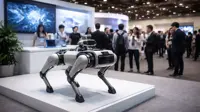Not wise to give sops for EVs and treat hybrids like sin goods: Toyota
29 Dec 2017
With the government having taken a policy decision to have only electric vehicles on India's roads by 2030, a senior official of Toyota's Indian arm has said this focus is misplaced, and pitched for a technology-agnostic approach giving more options for buyers and leeway for auto producers.
Shekar Viswanathan, vice-chairman and whole-time director at Toyota Kirloksar Motor, told PTI in an interview that consumers should be given freedom to make a logical choice said the government's ambitious target of all-electric cars from 2030 is "not practical, and it's not the way forward".
He argued that EVs alone are not the best answer to curb vehicular pollution. Customers who have a certain distance to travel every day will choose electric, and those who don't have a fixed schedule may choose a hybrid.
"In time to come, others may choose hydrogen because there is zero pollution in hydrogen vehicles. So I think the government has to recognise this, be technology-agnostic, encourage all technologies and fix tax rates accordingly," he said.
"All technologies must be encouraged because nobody knows which technology is going to succeed.''
Technologies which generate more pollution have to be discouraged, while those which minimise the amount of pollution should be encouraged through financial incentives and disincentives, he said.
"I don't think electric vehicles are the immediate answer. Yes, there will be a certain percentage of vehicle population which will have electric, but we still have to rely on the internal combustion engine, hydrogen vehicles and hybrid vehicles for the remainder," Viswanathan said.
Asked if India should avoid rushing into an era of EVs, he said, "If that's what the consumer wants, the rush will happen on commercial terms, but if you (government) mandate that I will give huge tax incentive for electric but I will penalise hybrid, which is very friendly in terms of pollution levels, then it's not a level playing field."
The government needs to recalibrate the tax on hybrids, particularly on strong hybrids which function like electric vehicles, he suggested.
"The important point is not whether we will be driving hydrogen vehicles, or continue with internal combustion engine or move to pure electric or hybrid. The point is, are you giving enough freedom for consumers to make a logical choice, and are you giving the producers enough leeway so that they can produce what the consumer wants?
"You have to give a bouquet of options to car customers and customer will choose. Now, if you penalise obviously polluting vehicles, which run on BS-III and BS-IV, BS-II and BS-I ... they need to be removed from the roads first, and I wish the government takes action on that," he said.
"Today you have this lopsided tax structure where electric vehicles attract 12 per cent tax, and hybrids are treated like sin goods," he said.
According to him, major car players in the world have all the technologies, electric, and hybrid, internal combustion engine, that too BS-VI and they will progress towards BS-VII, giving very clean emissions.
"But to commercialise and make it a practical proposition for the consumer, we have to stitch it by market-to-market," he said.
In some parts of India, EVs may well succeed because of enough charging infrastructure, adequate power, and a grid that is able to withstand surges in power drawing, among other things.
"But is it possible across India? I don't think so. Because in certain pockets of India you don't have power, let alone quality power. I think it's better to take a cautious, practical approach than making grand statements that we will be 100 per cent electric (from 2030)," Viswanathan said.
"You can't say EVs are not polluting at all if you are going to generate power from coal-fired power stations. There will be pollution then. You have to measure this entire thing on 'well to wheel basis' and you have to measure total pollution for each form of transport and then fix the taxes accordingly. So, more polluting ones should be penalised more and less polluting ones should be penalised less," he said.


















